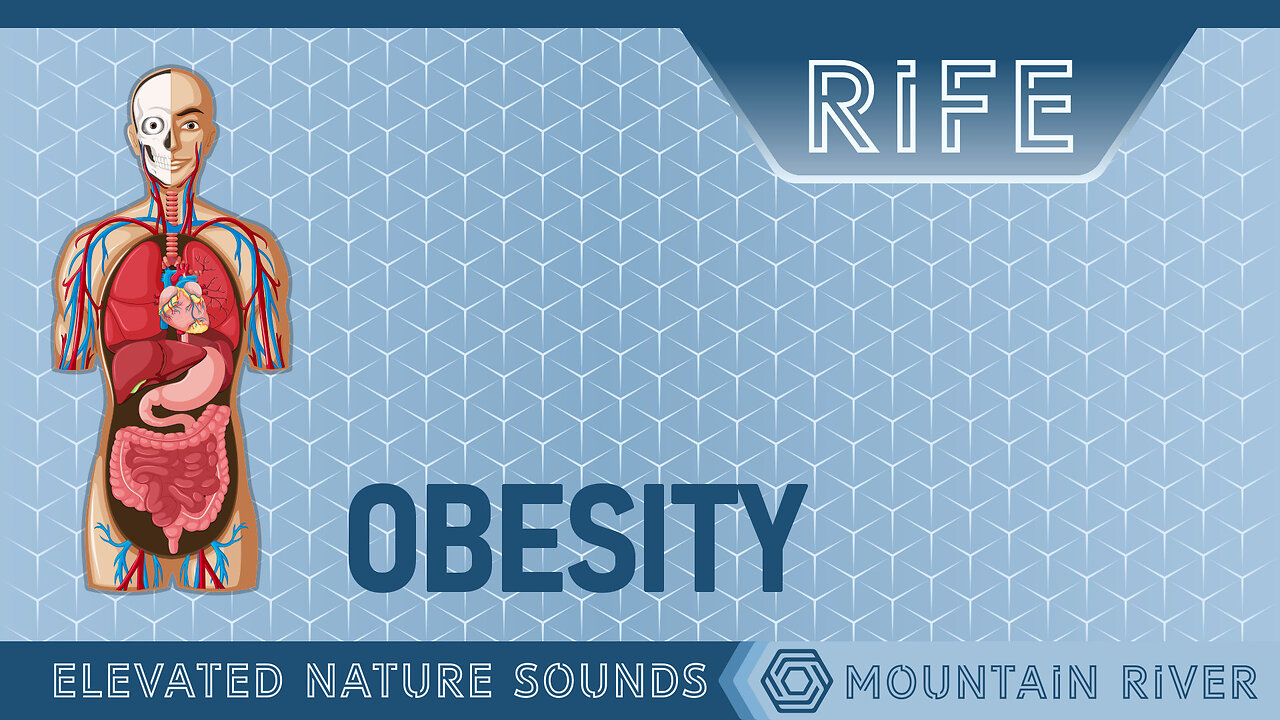Premium Only Content

HEALING OBESITY with RIFE
Obesity is a medical condition characterized by an excessive accumulation of body fat, to the extent that it has a negative impact on an individual's health. It is typically determined by calculating the body mass index (BMI), which is a ratio of weight to height.
Obesity is influenced by a combination of genetic, environmental, behavioral, and metabolic factors. While genetic predisposition may contribute to an individual's susceptibility to weight gain, lifestyle choices play a crucial role in the development of obesity. Sedentary behaviors, such as lack of physical activity and excessive screen time, coupled with unhealthy dietary patterns, including the consumption of calorie-dense and nutrient-poor foods, can lead to an energy imbalance, where calorie intake exceeds expenditure.
The consequences of obesity on health are significant and wide-ranging. It increases the risk of developing various chronic diseases, including type 2 diabetes, cardiovascular disease, hypertension, certain types of cancer, respiratory disorders, and musculoskeletal problems. Obesity also affects psychological well-being, with higher rates of depression, anxiety, and low self-esteem observed among individuals with obesity. Additionally, it can impact reproductive health, sleep quality, and overall life expectancy.
Diagnosing obesity involves assessing BMI, waist circumference, and evaluating associated health risks. Healthcare professionals may also consider other factors such as medical history, physical examinations, and laboratory tests to determine the underlying causes and potential complications associated with obesity.
Managing obesity requires a comprehensive approach tailored to the individual. Treatment strategies often involve lifestyle modifications, including dietary changes to promote healthier eating habits and portion control, increased physical activity, and behavioral therapy to address psychological and emotional factors related to food. In some cases, medical interventions such as pharmacotherapy or bariatric surgery may be considered for individuals with severe obesity or obesity-related complications.
Preventing obesity is an important goal, and it involves promoting healthy lifestyles from early childhood. This includes educating individuals about the benefits of regular physical activity, balanced nutrition, and the avoidance of excessive calorie intake from high-sugar and high-fat foods. Creating supportive environments, such as access to affordable and nutritious food options and opportunities for physical activity, also plays a crucial role in obesity prevention.
In conclusion, obesity is a medical condition characterized by excessive body fat accumulation, influenced by a combination of genetic, environmental, and lifestyle factors. It poses significant health risks and requires comprehensive management strategies tailored to the individual. Prevention efforts focused on promoting healthy lifestyles are vital in addressing the obesity epidemic.
*******************************************
Your support is greatly appreciated
https://donate.stripe.com/9AQdSq9MO0vY8YoaEE
*******************************************
+ Every original audio on this channel is recorded in HQ 44100Hz (never compressed)
=============================
+ Audio is multilayered with pure tones, solfeggio frequencies, masking noises underneath ambient sounds of nature.
=============================
+ All audio recordings are my original work and are not available in any public sound file library.
=============================
+ Additional sound layers are created in collaboration with wonderful artists from different platforms such as Mixkit, Pixabay, Free Sound Library, FreeSound…
=============================
DISCLAIMER - CONTENT OF THIS CHANNEL
Please note that the information provided is not intended to be a substitute for professional medical advice, diagnosis, or treatment. The content is for informational purposes only.
-
 8:00:28
8:00:28
Elevated Nature Sounds
2 months ago8-Hour Sleep Cycle Frequencies: Lakeside Crickets with Black Screen Calm
1.09K2 -
 4:42:42
4:42:42
The Pascal Show
18 hours ago $0.89 earnedDIDDY TRIAL LIVE! Feds FINAL WITNESS Testifies! Gov't To Rest Today Diddy Trial Day 28
11.3K1 -
 1:51:14
1:51:14
The Michelle Moore Show
1 day ago'The Iran-Israeli Conflict...What It Means For America, Florida's Alligator Alcatraz, UK Babies to Receive DNA Testing, and more' Lt. Mark Taylor: The Michelle Moore Show (June 23, 2025)
24.3K41 -
 3:15:48
3:15:48
FreshandFit
7 hours agoMyron And Zherka Kick Out Annoying Rude Girls!
204K56 -
 1:57:25
1:57:25
Inverted World Live
8 hours agoGiant Eyeball Falls Out of Sky | Ep. 63
119K18 -
 1:47:25
1:47:25
Badlands Media
13 hours agoBaseless Conspiracies Ep. 138: Nuclear Narratives, Controlled Collapse & the Currency of Fear
68.7K39 -
 3:00:11
3:00:11
TimcastIRL
9 hours agoTHE WAR IS OVER, Trump Announces CEASEFIRE In Israel Iran War | Timcast IRL
290K223 -
 8:15:59
8:15:59
RalliedLIVE
11 hours ago $10.31 earnedMonday WZ - Specialist Addict Gets Wins
104K5 -
 6:31:38
6:31:38
SpartakusLIVE
10 hours agoSpart RETURNS || The Masses REJOICE
79.7K5 -
 2:54:15
2:54:15
Barry Cunningham
10 hours agoBREAKING NEWS: THERE'S SO MUCH WINNING FOR PRESIDENT TRUMP AND AMERICA TONIGHT!!
86K65